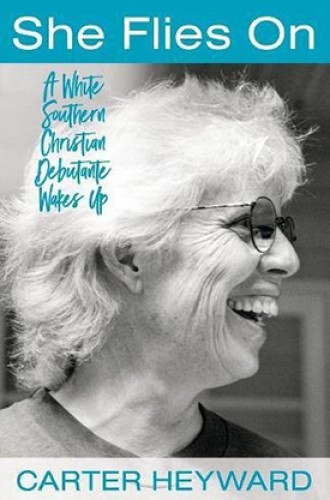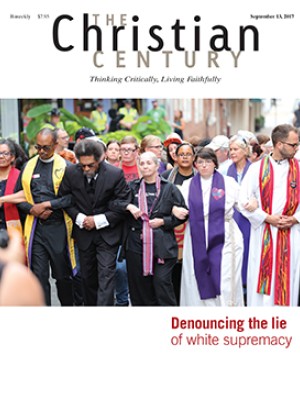The personal is political—and universal—for Carter Heyward
Heyward was one of the first women priests. But her particular experiences aren't the heart of her memoir.
If you enter this book with the expectation of a traditional memoir, you will likely end up disappointed. Carter Heyward is, as she says, a theologian “to her toes.” While she takes on the difficult task of integrating theology and personal story in this book, she is far more interested in the theology than the story. The pleasures of memoir—the deep dive into someone else’s experience, the treatment to the smell, taste, and feel of a realm not your own—are, for the most part, absent. What the book does instead is weave together three languages: the personal/individual, the political/ideological, and the universal/theological. But these three languages sit awkwardly on the page together.
For example, with her characteristic mix of humor and theological loftiness, Heyward tells us about her birth:
And, somehow, in the midst of all this terror and hope, a whole bunch of human babies fell out of that universal womb into infancy on this terrestrial ball. That is how it always begins for God, and that is how it began for me and for all the other babies who arrived in 1945.
Read our latest issue or browse back issues.
To contend with the strangeness of this description, we might start with the mix of the colloquial (a “whole bunch of babies”) and the theologically complex assertion of a “universal womb.” Usually when we speak of a person’s birth we are concerned with that person’s own place and time, that person’s own mother’s womb. Adding in “a whole bunch of babies” creates a very strange picture: I personally see babies hurtling toward earth in large numbers, as if they’ve been dropped from a great height. The sentence confounds my expectations.
Then the theologian is born. Birth begins with the universal (“for God”), then becomes personal (“how it began for me”), and then extends to the political (“all the other babies who arrived in 1945”). We are not accustomed to holding these three things together on the same page, let alone in the same sentence. Traditional memoir might let us linger in the hospital, perceiving the weather or the relationship between the parents. We would understand something about Heyward’s own moment in time and space. Traditional theology would leave out the theologian’s birth all together. Heyward not only draws these together, she adds in all the other babies born in the devastating year 1945. Her mention of that year evokes images of Hiroshima, Jim Crow, the end of World War II.
Heyward knows the strangeness of what she’s done here; she has lived it. Her assertion of the connections between the personal, the political, and the universal has led to many controversies in the past. She’s been accused of conflating herself with God, overvaluing her own experience in the work of theology, and disrupting sacred things with politics.
Heyward has already told us that she doesn’t want her readers to think that her birth matters more than any of the other births in 1945. Nor does it matter less. She is engaging an abiding and unresolved question about particularity: her experience as a “white southern Christian debutante” matters tremendously. It also does not matter at all. As she says in the introduction, “These statements are equally true.” The book circles back again and again to this paradox.
But particularity does not mean the importance of Heyward’s own experiences growing up in North Carolina, reckoning with her sexuality, admiring Julie Andrews, deciding to become a debutante for the sake of her grandmother, facing eating disorders and alcoholism, being one of the first women ordained as a priest in 1974, and falling in love. She treats all these experiences lightly, though any one of them might be memoir material on its own. Instead, the personal becomes an intersectional category: white, southern, female, homosexual or bisexual, of a certain social moment and class. Particularity is the meeting up of categories.
Although she tries to get “beyond binary categories,” they are essential for Heyward’s politics and theology. “White,” “female,” “southern” still play significant roles. She admits that these categories are becoming less tenable in her own social and political circles, as they give way to the fluidity of experience. Transgender and multiracial people are undoing the binaries on which the past was built. At the same time, when we forget the categories we risk forgetting the central place of politics in theology. Without categories, we risk using colorblindness, for example, as a mask for bias or hate.
Toward the end of the book, Heyward tells a funny story about a lesson in horseback riding. Riding her beloved horse, Red, she was having a difficult time getting the horse to do what she wanted. If she wanted the horse to go right, Red went left. If she wanted to speed up, Red slowed down. Her trainer, from the other side of the riding area, urged her to “communicate with your horse, Carter!” She began to talk to Red, “as I would have talked to a child.” The trainer corrected, “I didn’t say talk to her—I said ‘communicate’!”
While reading She Flies On, I too often felt talked to instead of communicated with. Heyward heads off into long disputations with an imaginary interlocutor, who I didn’t feel was me. She offers theological and political flights that I didn’t feel inclined to take. Emotionally, I rarely felt connected with the author. And yet, I found the enterprise a worthy one—full of complexity and ambition—a deep attempt to live what one has taught and believed with energy and devotion and care, to bring together in language and in a particular life things too often left separate.







